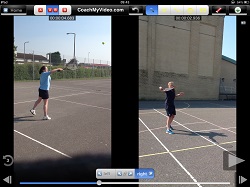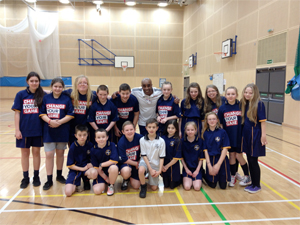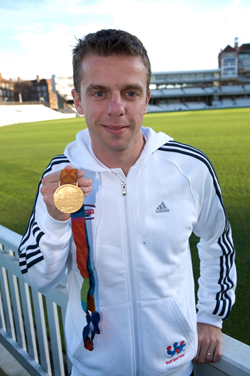Reflecting on her year long ‘Learning Innovator’ project, Physical Education teacher Lizzie Wolstenholme investigates different apps for the iPad to determine which ones are most effective at helping students to learn new sports skills, such as the backhand in tennis. One particular app proves that iPads can be beneficial in providing an opportunity to replay students' technique and compare it with the teacher's in a split-screen synchronisation.
Her evaluations suggest that iPads are incredibly diverse in their application into different subjects, largely down to their portability, high specs and the lengthy extent of the ever-growing, possibly immortal, app store.

When I first took up the role of introducing ICT into our PE department I have to admit, I thought I might be spending the year trying to find innovative ways to use flip cams, stopwatches and televisions.
I now can’t believe how wrong I was. I feel like the many uses of ICT are so vast and that actually, I’m only just scraping the top of the iceberg.
My role so far has involved working closely with two classes, a GCSE Dance group and a Year 9 Gifted and Talented group. These classes have been subject to top of the range ICT access, such as iPods, iPads, Twitter groups and Edmodo as a homework tool.

The ability to set goals and understand the steps necessary to achieve them is a key skill for secondary school students looking to succeed in life and work. Whether it’s encouraging pupils to discover the desire to improve, to follow their dreams or to learn from their mistakes, having dreams and ambitions can turn young people’s lives around.
It was a skill I learned from a young age growing up in the tough Toxteth area of Liverpool during the 1970s and 1980s. My skateboarding career began by accident when I was on a school trip to Liverpool museum aged 14 and saw a performance by American skateboard team, Hobie. My family didn’t have much money, but I was determined to learn the sport so I built a skateboard from a plank of wood and my sister’s roller boots!

The ability to respond and adapt efficiently when under pressure is a skill that can make a huge difference to the future of secondary school students. Whether it’s having the strength to say no to a situation they are not comfortable with, the confidence to talk in front of a large group, or the aptitude to come through a difficult day smiling – mental toughness is key.
It was a skill which I was forced to learn at a young age when, aged just eight, I discovered that I was losing my sight. My initial reaction was a complete loss of heart and I felt my future dreams had been shattered but taking up running gave me a whole new identity. I quickly progressed from the back of the pack to the one leading from the front and that changed my entire attitude towards myself and my disability. I stopped pigeon-holing myself as the only blind kid at school and, drawing on my own courage and resiliency, made the positive decision to focus on my future career as an athlete.
I may now be a professional athlete but there are still plenty of occasions when I have to be psychologically strong, from forcing myself to get up and out to training at 5:30am on a cold, wet, winters day, to competing in front of 80,000 people at an athletics competition. The students I work with on behalf of the Youth Sport Trust each have their own challenges to face and I feel it is vitally important to ensure they are equipped to cope with school and life in an increasingly fast moving world.

A community-driven platform for showcasing the latest innovations and voices in schools
Pioneer House
North Road
Ellesmere Port
CH65 1AD
United Kingdom